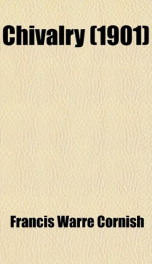chivalry

Purchase of this book includes free trial access to www.million-books.com where you can read more than a million books for free. This is an OCR edition with typos. Excerpt from book: CHAPTER II Knighthood Origin of knighthood in Gaul and GermanyCeltic element unimportantInstitutions of Teutonic nationsMilitary democracy tending to aristocracyCeremonies of early knighthoodCavalryEquality of knighthoodInfluence of the Crusades Different development in England, France, Germany, etc.Feudalism and chivalry more French than English English in the Crusades Richard I England brought into the European systemApprenticeship in armsKnighthood as an incident of land-tenure and a reward for serviceKnighthood conferred at the age of twenty-oneDecline of knighthoodBrotherhood in armsRenunciation of brotherhood Ideals of chivalryNelson Don Quixote St. Francis Conception of chivalric virtueReality of knighthoodIts dignitySir Tristan. The words Chivalry and Knighthood are strictly speaking identical, since Chevalier and Knight1 are synonyms; but in common usage 'chivalry' denotes the whole group of ideas and customs which prevailed among the noble and gentle caste: 'knighthood' the estate itself: an estate within which all who were admitted to it were equal, whatever differences of descent or rank might exist among them. The origin of knighthood is to be nought in the primeval customs of the Gallic and Germanic tribes which overspread the whole of Western Europe, beginning from a period 1 The A.S. word cniht (boy, youth) was used before the Conquest to mean a dependant holding land from one of the great vassals by knight service (militia), whether dubbed knight or not. Similarly serviens (serjeant or esquire) is a military dependant not of knightly estate. Oman, Hist: of the Art of War, p. 369. antecedent to all historical records, and only to be traced by archaeological and linguistic evidence. Although the early instit...
Info about the book
Author:
Series:
Unknown
ISBN:
1116211238
Rating:
3/5 (3)Your rating:
0/5
Languge:
English
Users who have this book
Users who want this book
What readers are saying
What do you think? Write your own comment on this book!
write a commentif you like chivalry try:
Do you want to exchange books? It’s EASY!
Get registered and find other users who want to give their favourite books to good hands!


